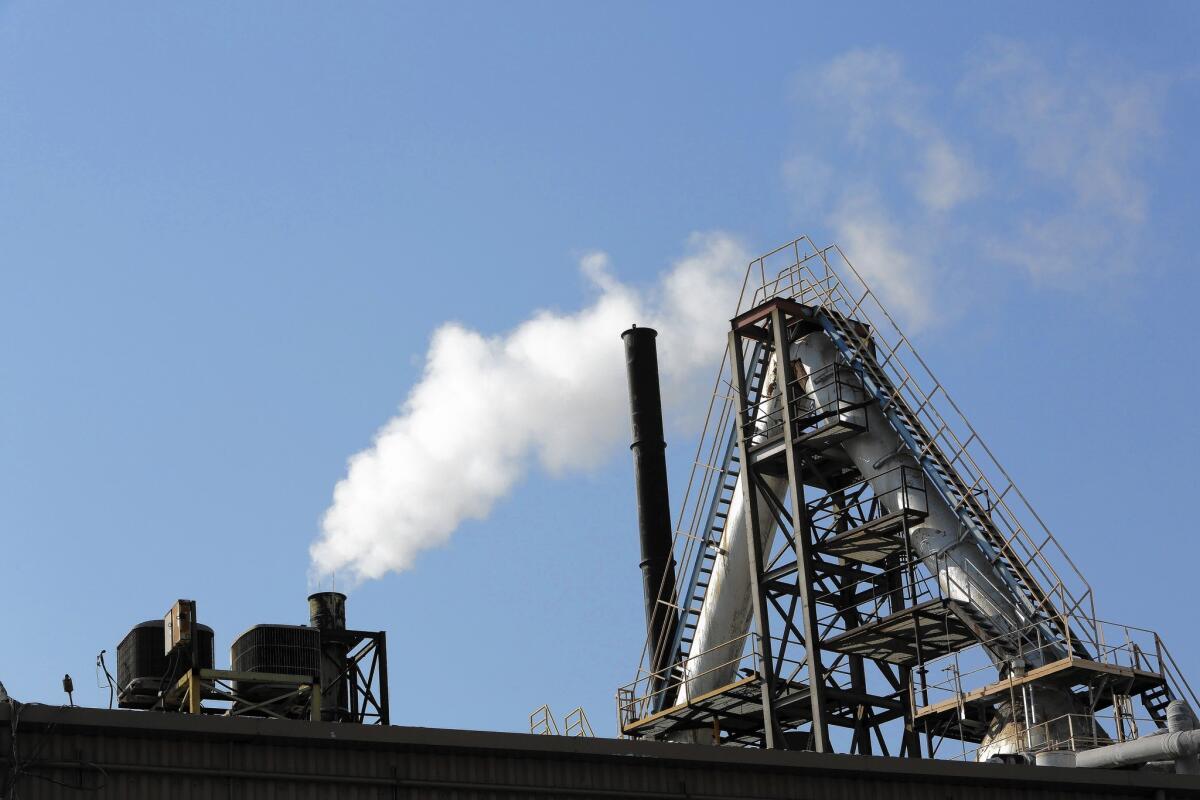Few residents near Exide plant undergo testing for lead levels

- Share via
Los Angeles County’s attempt to test lead levels in the blood of people living near a Vernon battery recycling plant has not drawn enough participants to be of use in measuring the effects of its air pollution, county officials and health experts say.
The free blood screening is intended to address concerns that lead and arsenic emissions from the Exide Technologies plant have posed a health risk to residents in southeast Los Angeles County. Testing on a large scale has the dual purpose of providing a public service to individuals worried about their exposure and giving health officials important data to examine trends across the community.
But participation so far has been weak.
Of more than 100,000 people eligible for blood tests, about 160 have taken advantage of the voluntary screenings since the program began in April. Fewer than 10 of those were children, who are at higher risk of lead poisoning.
Having so few children tested is a major problem, said Dr. Kim Dietrich, a professor at the University of Cincinnati College of Medicine and expert in the effects of lead exposure in children. “Lead screening can be extremely effective, but you have to have a high participation rate and you have to target those who are most vulnerable.”
Lead is a potent neurotoxin that can damage the brain and nervous system and cause learning disabilities and behavioral problems. Children under age 6 are most at risk because their developing bodies can absorb more of the metal and they spend more time near the ground, where they can ingest lead dust.
Community leaders and activists say the county has botched the program by doing little community outreach and failing to tell residents that the tests are related to the long-standing controversy over Exide’s emissions. The county is overseeing the testing, which is paid for by Exide under orders from state environmental regulators.
The county mailed fliers to about 50,000 households in a roughly two-mile radius of the Exide plant. But the mailing made no mention of Exide, which has been the subject of extensive news coverage in English- and Spanish-language media.
Interested residents must call a hotline to request a mailed-out form, then visit a lab to have their blood drawn.
Most people in nearby Maywood “have not even heard the blood testing is going on or that they can go in and participate,” Mayor Oscar Magana said.
The smattering of test results so far have found no lead levels high enough to require medical intervention. But environmental health experts say the county must conduct many more tests, especially on children under age 6, before it can draw any conclusions about the community’s exposure to lead from the plant.
So far, fewer than five adults registered above 5 micrograms per deciliter, a level that the U.S. Centers for Disease Control and Prevention considers elevated in children. No child had levels higher than 2 micrograms per deciliter, the health department said.
Dr. Cyrus Rangan, director of county health’s Bureau of Toxicology and Environmental Assessment, said the findings were encouraging “but we still don’t have the numbers to say anything definitive about what’s going on.”
Rangan said the department omitted references to Exide in mailings because the county wanted the pool of participants to be as broad as possible — not limited to those people concerned about only Exide. He said the department was looking for ways to boost participation in the program, which runs through September.
Dietrich, the professor who studies lead exposure, said the county could recruit door-to-door and at health fairs, schools, churches and community centers, or it could use portable lead-testing devices that offer immediate results without a visit to a lab.
The value of the tests is limited even in the best of circumstances because they are most useful for detecting recent, acute exposure. The tests cannot trace lead in the blood to a particular source so they will probably never resolve the central question of whether Exide caused harm to surrounding residents.
Still, broad participation could show whether people living close to the plant have higher lead levels than those living farther away.
The South Coast Air Quality Management District ordered Exide in 2008 to cut production temporarily after the Vernon plant violated lead emissions standards five months in a row. While the facility has since made upgrades and reduced its emissions, air quality officials have cited Exide more than 30 times over the last two years for violating lead standards.
The plant has been idle since March because it cannot comply with new regulations adopted by the air district.
The recent uproar over Exide stems from a March 2013 air district report that found the plant’s arsenic emissions posed an increased cancer risk to more than 100,000 people in the area. The revelation has provoked outrage from community groups and elected officials, who have rallied to close the facility permanently.
After the blood screening program ends, county health officials plan to issue a report and hold a community meeting to review the findings.
Environmental regulators across the nation have turned to mass blood testing before to gauge potential harm from mining operations, smelters and other stationary sources of lead pollution.
Texas health officials in 2011 offered free blood lead testing to residents near an Exide battery recycling plant in Frisco and collected more than 600 samples in four days. The analysis found only two participants with levels over 10 micrograms per deciliter, and both were adults.
[email protected]
Twitter: @tonybarboza







